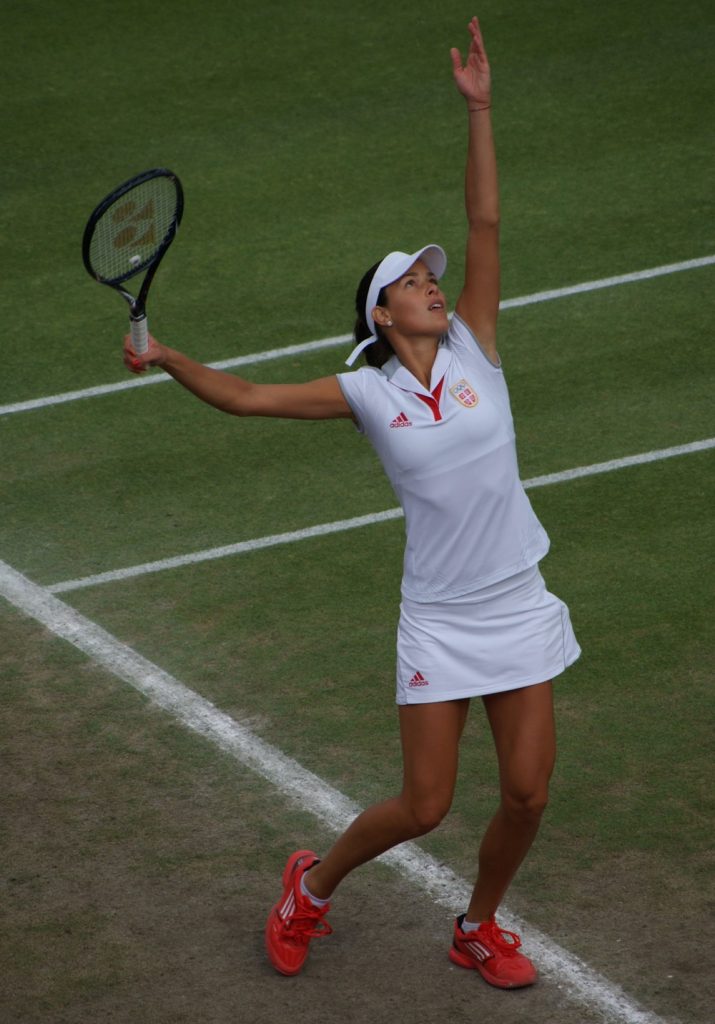
Let’s examine it in more detail.
There are a lot of things that make tennis different than traditional Sports such as American football, basketball, baseball, etc. In this article I’m going to attempt to outline the distinct differences between a professional tennis player and other professional athletes. We will also attempt to answer whether professional tennis players are born or made.
Let’s take for instance an athlete who plays professional basketball…
It’s very rare for one of these athletes to progress into the professional league without first playing a college career – this is because of the way that professional sports are set up and the rules about recruitment. A high school basketball player who has talent may get a scholarship, which will allow them to play in college sports, in hopes that they will one day be drafted onto a professional roster, where they can make millions of dollars. Same goes for American football. You have an athlete that is talented in high school. If they’re lucky they may get a scholarship and have a chance to play in college in hopes that they can go pro someday. You never know…
Now let’s look at the sport of tennis…
Tennis players are allowed to play in the WTA or ATP Professional level at age 15, where they can participate in up to three tournaments per year. At the age of 18 you can play as many tournaments as you’d like just like any other player. There is no requirement to be drafted, and no tryouts. Which means unlike American Football, Basketball, and Baseball athletes are going pro as teens. You show up to a tournament, qualify, and you’re in, that’s all it takes.
Why do tennis agencies recruit players so young?
The business of recruitment in tennis isn’t regulated by the same rules as other sports…
In tennis it isn’t uncommon for a professional athlete to have been recruited by a tennis agency at a young age. For example Carlos alcaraz who is currently number one on the ATP Tour, and who at the age of just eighteen was the youngest player ever to win a grand slam, was recruited at the age of 12. Maria Sharapova who famously won Wimbledon at the age of 17 was also recruited at the age of 12. Prior to Carlos Alcaraz being the youngest Grand Slam winner in 2022, Emma Raducanu was the youngest person to win a slam. All of these athletes turned pro as teens and in fact all of them were represented by the same agency (IMG) when they won.
Another reason tennis agencies sign athletes early on is because the athletes need to work with various coaches and trainers who can help them shape their game while their game is at a point where it’s most malleable. Of course none of this can be done without a certain amount of raw talent which is what the agencies are looking for when they put on tennis academies and camps for young athletes – they’re looking for the next bright young talent they can mold into a star!
There are several defining characteristics that make up a tennis prodigy.
The first is someone who has exceptional qualities or abilities. This is important because agents are looking for someone who is going to be able to perform at the professional level and compete with the best in the sport. The next characteristic is someone who is an outstanding example of a particular quality, in this case: a whiz at the sport of tennis. And finally the last defining characteristic of a prodigy is an amazing or unusual thing, someone who is beyond ordinary or extraordinary. Someone who is extraordinary talented, an exemplary tennis player.
If you’ve ever watched a professional tennis match, you’ve probably noticed the players are exceptionally talented.
They’re not merely just high level athletes, they’re also gifted at playing the sport of tennis. Most of them have a strong sense of presence the court and hit the ball hard enough to cause difficulty for their opponents. They have natural power, stamina, and tennis IQ that is above most players their age. The best tennis players in the world are a bit like ‘poltergeists’: you can’t quite figure out how they work. You know what their muscles are doing, but not exactly how the decision to move them is made. Pro tennis players have an innate ability to balance between muscles and nerve impulses and what their minds perceive about the ball in flight. As Bernard Darwin said, “Some people have a natural gift for hitting the ball harder than others.”
Players today are judged by different criteria.
Newcomers tend to play better against ranked tennis players when they’re not expected to win. As a young prodigy, any wins are exciting and not taken for granted. Often after tennis prodigies get a little older and start entering into events with high seedings and expectations, their results tend to drop. They become the hunted and not the hunter. The difficulty of facing pressure can’t be underestimated. The fact that young players aren’t expected to win means they can swing away freely and go for their shots. A luxury they won’t have soon as they progress on tour.
It’s almost impossible to have a successful career in tennis if you didn’t start playing early.
Playing tennis requires such a level of hand-eye coordination that it’s virtually impossible to acquire without developing the feel for it without playing over an extended period of time. Most professional tennis players start playing when they are very young usually around the age of five. Think about it, when a young prodigy is around the age of fifteen, they’ve already been playing the game for a decade. You’d be hard pressed to compete against someone with that much experience if you’re just starting out. Sure you could start at 15 and try to develop it too, but most people are going through other things like college and work at 25 and they don’t have time to train and play tennis all day long. That’s why most players on the tour started playing early on.
It isn’t easy for a young player to break into pro tennis.
Especially in the early stages of their career, these players are still unfamiliar with their games, and it’s especially important to practice before tournaments. Experience and knowledge of their opponents’ games gives the older players an edge against the younger newcomers. If you see something that some players consistently get beat doing, you can capitalize on their weaknesses. That’s why watching tape on your opponents before matches is so important.
The circle of top tennis players today is very small.
This means that any two players probably know each other. There’s not much separation between them when they’re on tour. Any two top players could play each other and one player could win. This is contrary to, say, baseball, where a Triple-A player is nowhere near the same level as a major leaguer. With the seeding system they have in Tennis it’s fairly common for newcomers to have to face top seeded opponents in the draw. It’s not impossible for underdogs to beat top players either, even when those top players are playing well. The true champions are the ones who find ways to win even when they’re playing poorly. Tennis history is riddled with upset match wins, but there are far fewer cases of upstarts winning entire tournaments. And even fewer where they go on to claim multiple majors. One thing is for certain though, we will always remember the prodigies who win Grand Slams and go on to accomplish storied careers.
